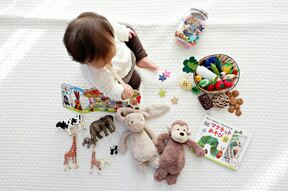
Potty Training
Anyone with children will go through or have gone through the potty training with the little one. Generally, it makes sense – child is showing interest in toileting, so we start to progress them in that way to becoming more independent. Some little ones pick up on it quicker than others. This is a time when the child is learning a new life skill!
But, what are some key things to consider before we take the plunge? We should note that cognitive ability and motor performance are related.
Other key considerations include:
- Strength
- Coordination
- Body composition
- Balance
- Postural control
- Overall muscle tone
- How a little one reacts/adapts to different sensations
- Motivation
- Age
So how can we help? You want to be able to recognize when your little one is truly ready. They are amazing little beings and will guide you. It is easy to say, but you shouldn’t be worried about a certain time being the best time to start your child learning this new skill. Every child is different, and it will range between 2 and 3 years old. If anything it is best not to rush the process. The bladder itself is developing connections or its ability to “talk” with the brain about what is going on. Only when a child is completely ready, will success of learning a new skill follow.
We had very different experiences with our two little ones. Our first, we were told, should be “trained by 2”. He was born on his due date, hit all the milestones as expected, started showing so interest in pottying, so we figured ok – why not. We started the process and it took 15months before he was free of diapers. He wasn’t ready. He liked the idea but his bladder to brain signal was not developed and he was training us to remind him to go. Our second little one, who was born a bit early, and later to walk, we waited. We waited until she showed genuine interest in pottying. She would verbalize what she was feeling. We watched for physical cues. And for her, once the process started, it seemed smoother and an easier transition within less than one month to no diapers. Again – every child is different and our experience will be very different from anyone else. But we learnt from our first to take it slower with the second.
Physiotherapy can assist with this journey, ensuring motor development has occurred optimally to allow for such the coordination of events required to become success with using the washroom independently.
This is just the beginning! Once your little one has appeared to succeed in using the washroom more independently, we tend to “forget” to monitor their success! Potential other issues can creep up, because once they are going on their own, we don’t know what they are truly doing. Future posts will touch on constipation and bed wetting and what they can be related to!
~Michelle, Pelvic Health Physiotherapist

 RSS Feed
RSS Feed